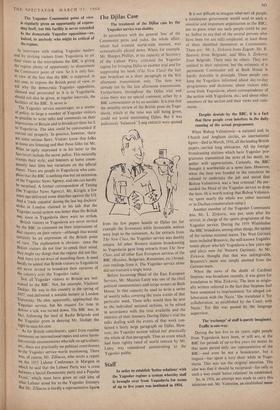The Djilas Case
The treatment of the Djilas case by the Yugoslav service was shabby.
In accordance with the general 'line' of the Communist press and radio, the whole affair, which had aroused world-wide interest, was systematically played down. When, for example. Mr. Morgan Phillips, in his capacity of Secretary of the Labour Party, criticised the Yugoslav regime for bringing Djilas to another trial and for suppressing his book (The New Class) the fact was broadcast in a short paragraph in the first afternoon transmission only. The item was already cut by the late afternoon transmission. Furthermore, throughout the Djilas trial and crisis there was no special comment, either by a BBC commentator or by an outsider. It is true that the monthly review of the British press on Yugo- slavia, which at the time was still being given, could not avoid mentioning Djilas. But it was judiciously 'balanced.' Long extracts'were quoted from the few papers hostile to Djilas (as for example the Scotsman) while favourable notices were kept to the minimum. As for extracts from The New Class, the Yugoslav service was doubly unique. All other Western stations broadcasting to Yugoslavia gave long extracts from The New Class, and all other East European services of the BBC (Russian, Bulgarian, Rumanian, etc.) broad- cast readings from it. The Yugoslav service alone did not transmit a single word.
Before becoming Head of the East European Services, Mr. Maurice Latey was one of the chief political commentators and script-writers at Bush House. In that capacity he used to write a series of weekly talks, covering the main events of that particular week. These talks would then be sent to the individual national sections, to be edited in accordance with the time available and the interests of their listeners. During Djilas's trial the talks dealing with the events of that week con- tained a fairly large paragraph on Djilas. How- ever, the Yugoslav section 'edited out' practically the whole of that paragraph. Thus an event which had been rightly rated of world interest by Mr. Latey was considered uninteresting to the Yugoslav public.










































 Previous page
Previous page